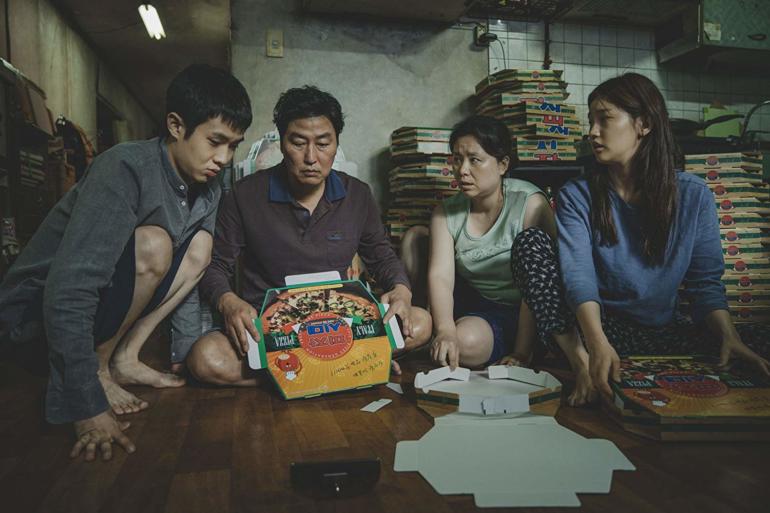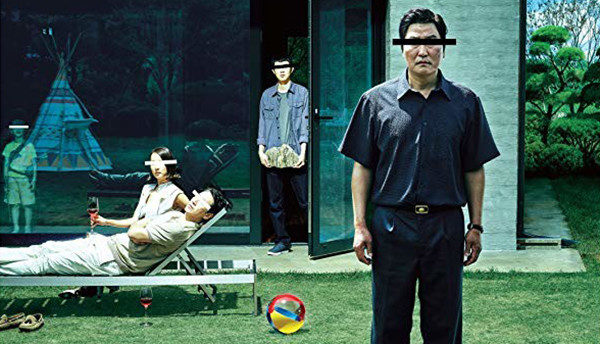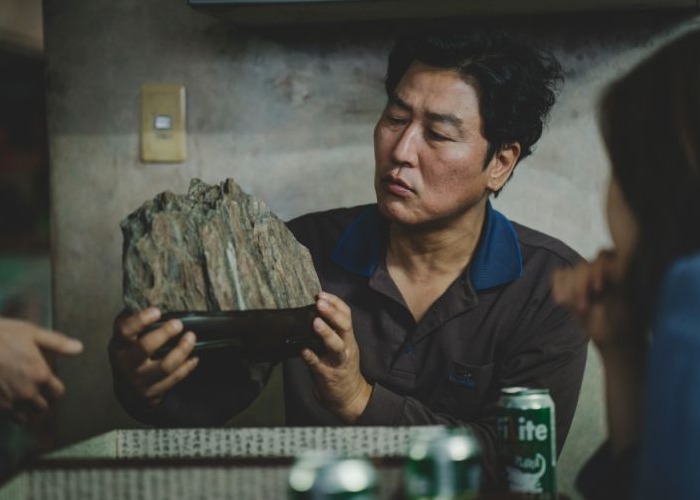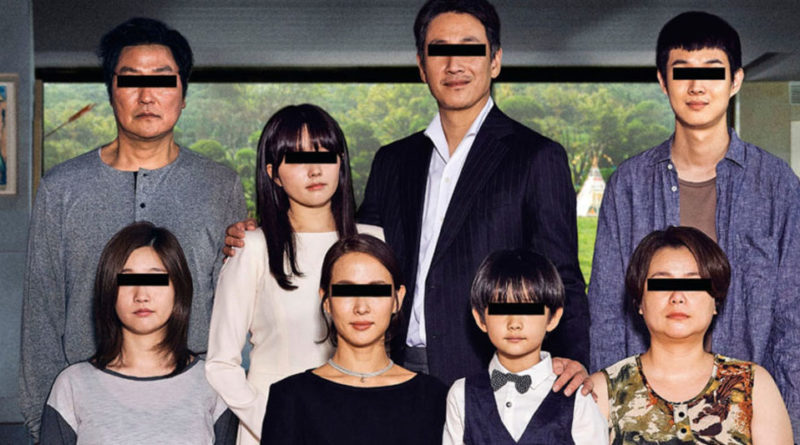Written by Harris Kassim
By the time you’re reading this, you have probably heard about this small film from South Korea called Parasite. The film just won the Screen Actors Guild Award for Best Ensemble, alongside great nominees such as The Irishman and Once Upon A Time in Hollywood. Also not too long ago, Parasite’s director Bong Joon-ho also received his award for Best Director at The Golden Globes and a Palme D’or at this year’s Cannes Film Festival.
I had the opportunity to watch it on the first day it was released after months of waiting and since then, no other films from last year have left an imprint in my soul as powerful as Parasite (as clichéd as that sounds, it’s true). The film starts off with the introduction of the Kim family which were living in poverty and has to make ends meet no matter the cost. Later, we are introduced to the Park family who lives on the opposite end of the spectrum, exceedingly wealthy but also blinded with materialism and ignorance. Ki-woo then found himself a job as a tutor for one of the Park’s children and discovered there is more to it for his own family. The story then unfolds revealing each of the characters’ worst qualities that are affecting each other, thus like a parasite. I believe that Bong made this film deeper than what it’s looked upon the surface as there is more into it.

It’s A Story About Class
This is fairly obvious for some people but yes, Parasite is a critique on human social classes. Think about it, the first character that we are introduced to was Kim Ki-woo, the son of the Kim family. He was having a hard time finding an internet connection that was not even theirs in the first place. Later on, he finally gets a connection from a coffee shop nearby by squatting next to their toilet bowl. This sequence alone perfectly portrays how the lower income group has to get creative just to get basic necessities, in this case, the internet.
Meanwhile the Park family are facing problems too, but in the most first world way possible. Mrs. Park decides to home-school both of her children knowing that she has all the money and all the time to do other things she prefers to do. This also contrasts Kim family where Ki-woo has to forge an education certificate that his family couldn’t afford to send him to. There are a lot of other critiques regarding social class spread out throughout the film as the director is also known for all his other works.
Adding on that, it’s interesting that the way Mr. Park looks down upon poor people to make him feel superior, is also what amusingly puts him at unease. The grimy scent of Mr. Kim which probably smells like wet clothes and subway trains are affecting them remarkably but rather of complaining, instead he keeps his nice facade through all of it because the perception of rich people is that they must be respectable. This shows the contrast between the two classes seamlessly in terms of their morality and insolence.

The Real Parasite Is In All Of Us
The film mirrors the reality of human beings, as human beings. There is no such thing as a perfect person in this world and we all have flaws that we are not proud of but can’t seem to get it removed. The way this film structures the idiosyncrasies of each perplexing character is undeniably mesmerizing. All characters have their own self-conceits, traits, behaviours and most importantly, an amalgamation between good and bad which creates a shade of grey that the audience will be left into.
If we look back to the story, each of the characters can be considered as parasites. The Kim family pulled off a heist-like situation that risks their lives in order to get a taste of what the wealthy lifestyle could be like for them. They all work for the Park family in incognito while also putting Park family at risk in unequivocal situations. For instance, when the Kim family is having the time of their lives exploiting Park’s residence, an old friend of theirs makes a surprise visit and eventually raises the stakes higher than ever for them.
Kim family which was obviously portrayed to be the protagonists in this story, is just as bad as the antagonists. They basically robbed Park’s family in the most anomalous way that it questions the ethics of their decisions. Later, when they found out that there is someone else living in the basement of Park’s house and being threatened for blackmail, they chose to act selfish in order to save their lives from getting caught, putting more lives at risk. Not looking so good now, doesn’t it?
As for Park family, truth be told they have no respect for their workers despite the nice-guy façade that they are putting on to the public. They are quick to blame it on people that they think are replaceable. When Kim’s daughter left her underwear in Mr. Park’s car, he promptly fires the driver instead of putting more thoughts into it. Additionally, it seems like the Park family is also rich in terms of ignorance as they can easily be manipulated, especially the mother. They are too comfortable with the life they’re living, making it easier for Kim family to take advantage of.

Metaphorically Sound
From the beginning, this film is full of metaphors that might fly over your head sometimes. One of the characters even said “This is so metaphorical” during the scene where they received a scholar’s rock from a friend. An article from The Hollywood Reporter said that the director admits the enigmatic rock plays a pivotal symbolic role in his acclaimed class-warfare thriller. The rock can be seen in many of the important scenes in the film and somehow, that rock is the cause that led them into all of the mess.
It was told that the rock given by a friend of the Kims is a symbol for good fortune for the family, but as it turned out it’s more of a blessing in disguise. The profound rock plays a significant part in the story, especially during the heavy flood scene. During the scene as we see that Kim family’s house is ruined by the overflowing water, Ki-woo found the rock magically floats above the water, landed into his hands. From that onwards, I immediately knew that the rock represents them as a family in tragedy. They have to move on and not give up, just like how the heavy rock floats atop.
During the rain, Mr. Park and his wife are sitting comfortably inside the house while their 10-year old son, Da-song is sitting in a camping tent outside having the time of their lives. Meanwhile, the Kims are frantically running away in the rain just to find out that their house is flooded. The next day, Mrs. Park said to her friend that the heavy rain was a blessing for their family, not so much for the Kims. It is no question that the rock is eventually being used by the real antagonist of the story causing a nightmare for the Kim family. They are their own worst enemies and they had to learn it the hard way.
In the end, we see Ki-woo puts back the metaphorical rock back into the river. It is without a doubt that the poor are representative of the rock, while the rich are represented by water. Like a rock formation in a river, the water flows and speeds past the rock, but the rock stays in the same place, slowly weathering away. In the end, the Kim family is inevitably stuck with poverty and despair, meanwhile the Parks moved on to better things with no predicaments.
In a figurative sense, Parasite is an in-depth study of humanity at its worst and it executed tremendously. It is rare to see a film like this which only comes once in a blue moon and especially being an Asian film that received so many accolades and rave throughout this year’s award season.


